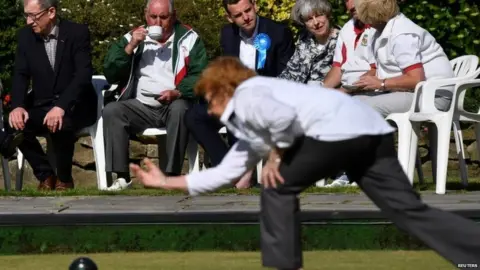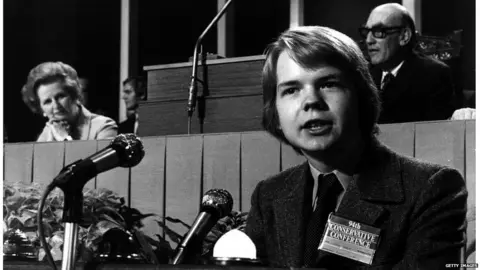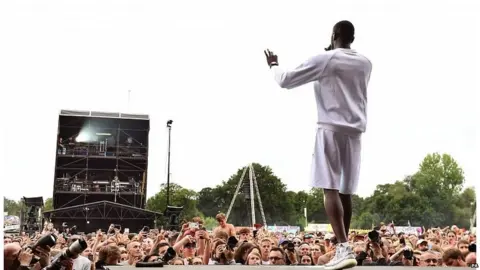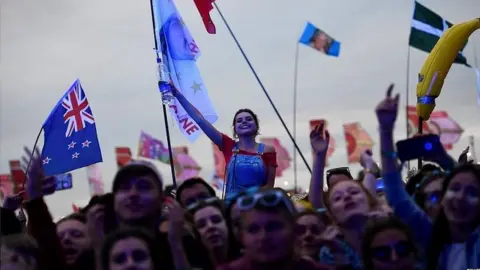How are the Tories going after young people?
 Reuters
ReutersWith viral campaign videos, the backing of grime MCs, and even an unofficial uniform of a bootleg Nike T-shirt - Jeremy Corbyn's Labour Party were the undisputed winners of the youth vote at the general election.
The British Election Study - the most detailed of its kind - found 62% of 18-25 year olds surveyed voted Labour - compared with just 18% Conservative. In fact, the study showed Labour was more popular among all age groups right up to the age of 45.
The grassroots group Momentum - which grew out of Jeremy Corbyn's leadership campaign in 2015 - has been credited with helping the surge in youth turnout, to its highest level in 25 years.
Though it is not formally affiliated to Labour - through its savvy social media campaign and ground army of activists, Momentum was crucial to helping the party defy expectations in June.
So how are the Conservatives responding? There's certainly been a lot of soul-searching since the election result and as the dust settles, some ideas are beginning to take shape.
The Tories have long had youth wings. The Young Conservatives, in its heyday, boasted tens of thousands of members and some prominent alumni - William Hague, for example, who made his name as a 16-year-old giving a rousing speech at the 1977 Tory party conference.
Over the decades, the group became divided, unpopular and troublesome to the party and it was William Hague - by then party leader - who, in 1998, decided to rebrand it as Conservative Future.
But two years ago, Conservative Future was itself engulfed in a scandal. One of its activists, Elliot Johnson, took his own life after complaining about bullying at the hands of Conservative supporters. It led to, among other things, the entire leadership of Conservative Future being suspended by Tory HQ.
Although the organisation was commanding no more than about 20,000 members in recent years - they had been active in previous elections, campaigning across the country.
Lack of message
This time round - there was a gap. How detrimental was that to the party?
"Its relationship with young people within the party was a lot weaker than it should've been," says Stephen Canning, who was vice chair of Conservative Future at the time its national executive was disbanded.
"There was no real incentive or message for young people in the party to stand up and shout for the party like there was for the Labour Party. There was no real concerted effort to get young people out there and doing stuff for the party and there wasn't really something for young people to believe in," he says.
He admits that when he was one of those in charge, Conservative Future missed a trick.
 Getty Images
Getty Images"We took too long to reform the organisation, we didn't see what we should be doing… it's much like the big tech companies - we've essentially been disrupted by a young start-up that is Momentum."
The Conservative Party is now drawing up proposals to reform and restructure Conservative Future - focusing on training young members in policy development, campaigning and media skills.
A spokesperson for the Conservatives said the party was continuing to support and work closely with a growing number of young members and volunteers.
But there are many within the party who think a structured youth wing has had its day, and that more organic, unaffiliated groups are the way forward.
And there are a number of them springing up. Just this week a group called Activate declared itself as a "national grassroots campaign organisation that seeks to actively engage young people in the right of centre politics".
Though it has already been subjected to online mocking - a possible £500 membership fee for over-25s might be a bit too eye-watering to really get the movement going - it does illustrate a trend.
Activist dialogue
Another group, formed last year, is Conservative Progress which also has the aim of becoming a real grassroots organisation.
"We saw a genuine need within the Conservative family for a constructive dialogue between the grass roots and the parliamentary party," says Nabil Najjar, one of the group's co-founders.
"We saw an opportunity there to take a leading role in training up-and-coming activists and providing a forum for Conservative Party volunteers to get involved in political discussions, to network and to try to develop a counter measure to all of the grassroots activity that Labour are currently involved in."
 PA
PABut can these new groups - disparate as they are - really hope to rival Labour's activist army?
Ben Howlett - himself a former chair of Conservative Future - was the Tory MP for Bath from 2015 until he was unseated by the Lib Dems this time round. He's now turning his attention to the grassroots too:
"I think there's an opportunity to grow a movement. Not a right-wing Momentum incarnate - I think that's a nonsense idea and frankly no one would turn up wearing fields of wheat T-shirts brandishing banners of Theresa May's face, it's just not going to happen.
"But there is an opportunity to get young people pushing a new type of direction within their own political parties."
And that will be telling - whether any of these new groups can develop to actually influence the direction of the Conservatives - in the same way that Momentum's support has helped solidify Jeremy Corbyn's leadership and vision for the Labour party.
'Sounding authentic'
Within the Tory party, there is now also a recognition that the Conservatives have for too long relied on the support of older voters and now need policies that directly appeal to young people, already largely disillusioned by Brexit.
"We need to look at the structure of tuition fees, the interest rate - there's some policy work, on housing as well," says MP George Freeman, who chairs the Conservative Party's Policy Forum and the Prime Minister's backbench Policy Board.
 Reuters
Reuters"Also campaigning, I think, [there are] some big questions- we were beaten soundly on social media. And I think thirdly there's a message about a new spirit of politics. I think people are distrusting of big machine politics, the repeated mantra, the line to take and I think they want a more authentic, personal political form of communication."
It's fair to say that when it comes to appealing to young people, the Tories have somewhat struggled with an image problem. And this year's "strong and stable" election campaign didn't do the party any favours in the cool stakes either.
George Freeman is organising an "Ideas Festival" in September - to try to stimulate some "fresh thinking" and new ways of communicating within his party, he says.
In thrashing out how the Conservatives should best respond to the huge mobilisation of young voters - the answer is unlikely to feature the words "Tory Momentum", even if the Labour-supporting group is the inspiration.
